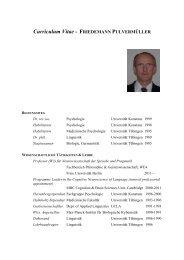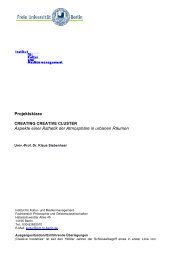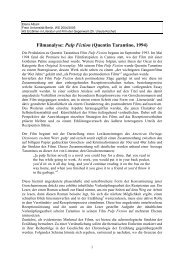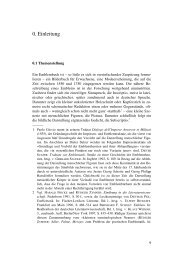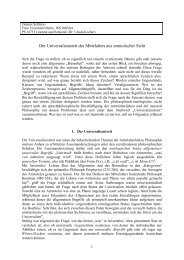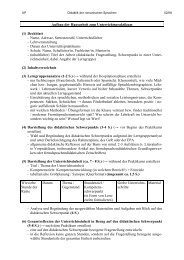nominalizations of french psychological verbs - Fachbereich ...
nominalizations of french psychological verbs - Fachbereich ...
nominalizations of french psychological verbs - Fachbereich ...
Create successful ePaper yourself
Turn your PDF publications into a flip-book with our unique Google optimized e-Paper software.
244<br />
JUDITH MEINSCHAEFFER<br />
<strong>verbs</strong>. In section 6, it is shown that, drawing on three additional realization rules,<br />
the correct distribution <strong>of</strong> the different types <strong>of</strong> complements to <strong>psychological</strong><br />
<strong>nominalizations</strong> can be derived from the semantic representations proposed for<br />
the <strong>verbs</strong>.<br />
5. Semantic representations for <strong>psychological</strong> <strong>verbs</strong><br />
It is a commonly held assumption in lexical semantics that the meaning <strong>of</strong> a<br />
lexeme can be decomposed into atomic predicates. One <strong>of</strong> the basic claims <strong>of</strong><br />
such an approach is that <strong>verbs</strong> sharing certain atomic predicates also share some<br />
<strong>of</strong> their grammatical properties. Hence, the decompositional semantic<br />
representation <strong>of</strong> a lexeme is claimed to encode not only the meaning, but also<br />
some <strong>of</strong> the grammatical properties <strong>of</strong> this lexeme. Within a decompositional<br />
framework, the analysis presented here aims at deriving the argument-realizing<br />
properties <strong>of</strong> three different classes <strong>of</strong> <strong>psychological</strong> <strong>nominalizations</strong> from the<br />
meaning <strong>of</strong> the underlying <strong>verbs</strong>. To this end, I propose that the meanings <strong>of</strong> the<br />
three verb classes from which the <strong>nominalizations</strong> are derived can be represented<br />
as in (19).<br />
(19) a. regretter PSYCH_RELATION (x, y)<br />
b. fasciner CAUSE (ACT (y), PSYCH_RELATION (x, y))<br />
c. étonner CAUSE (ACT (y), CHANGE (PSYCH_STATE (x))) 4<br />
The decompositional representations are intended to be interpreted in terms<br />
<strong>of</strong> the paraphrases given in (20).<br />
(20) a. “If x regrets y, then x stands in a <strong>psychological</strong> relation to y.”<br />
b. “If y fascinates x, then some action <strong>of</strong> y causes x to stand in a<br />
<strong>psychological</strong> relation to y.”<br />
c. “If y astonishes x, then some action <strong>of</strong> y causes x to come to be<br />
in a <strong>psychological</strong> state.”<br />
Note that, since we are interested here in expressing generalizations concerning<br />
the relation between semantic participants and syntactic complements, but not in<br />
properties <strong>of</strong> individual lexical items, the representations in (19) consist entirely<br />
<strong>of</strong> highly general atomic predicates like CAUSE, ACT, PSYCH_STATE, termed ‘base<br />
predicates’, abstracting away from semantic differences which do not appear to<br />
be reflected in the syntactic realization <strong>of</strong> semantic participants.<br />
4 For this class <strong>of</strong> <strong>psychological</strong> <strong>verbs</strong>, similar representations have been proposed by Wanner (2001)<br />
and Iwata (1995). The assumption that EO-<strong>verbs</strong> are causative is also made in some syntactic<br />
accounts <strong>of</strong> <strong>psychological</strong> <strong>verbs</strong> (e.g., Pesetsky 1995).





